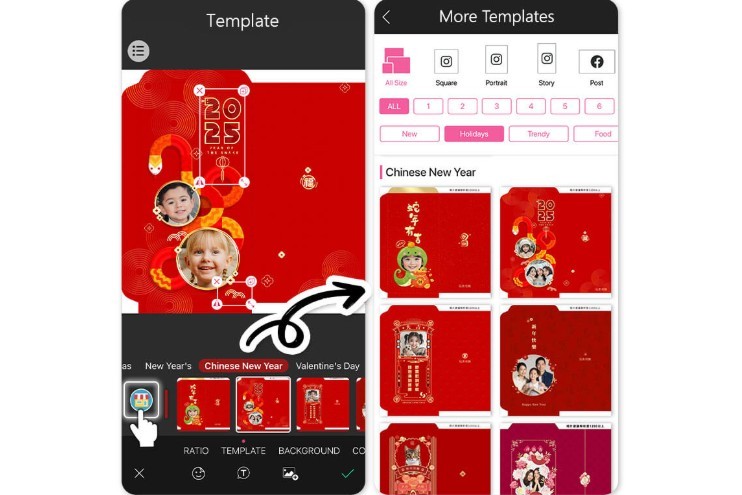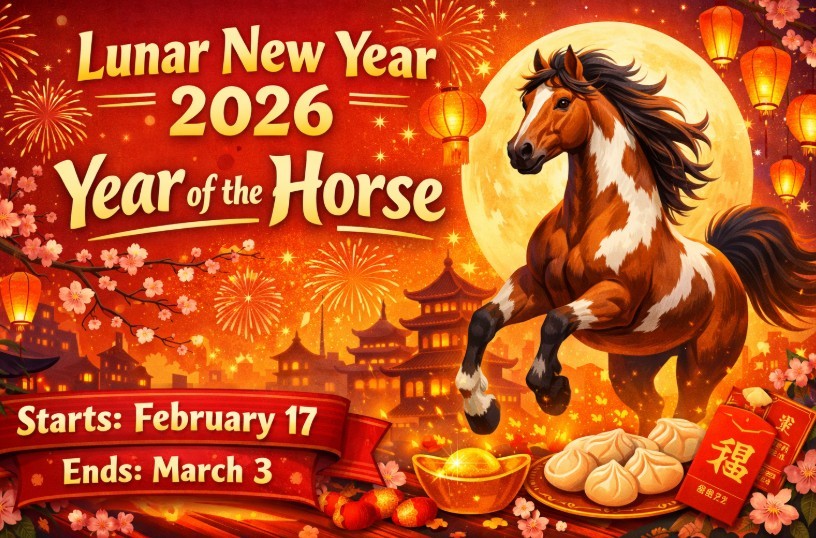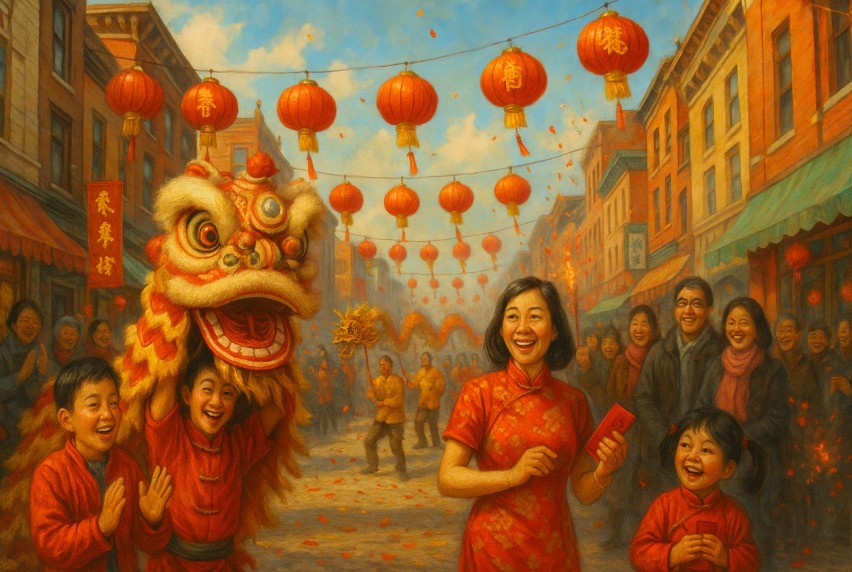DO and DON'T During 15 Days of Lunar New Year
| Table of Contents |
History of Chinese New Year
In certain Western countries, the term "holiday season" usually refers to the time between Thanksgiving dinner and New Year's Day. But soon after, in several Asian countries, there's another big holiday that brings people together with friends and family, and concurrent celebrations continue the traditions back home. The Lunar New Year, also known as the Spring Festival or Chinese New Year, usually occurs every year between January 21 and February 20.
The reason it is called the Lunar New Year is that it is the first new moon of the lunisolar calendars, which are based on the cycles of the moon and sun, that are customary in many east Asian nations, such as China and Vietnam. According to the New York Times, "A solar year—the time it takes Earth to orbit the sun—lasts around 365 days, while a lunar year, or 12 full cycles of the Moon, is roughly 354 days." Similar to the lunisolar calendar used by the Jews, "a month is still defined by the moon, but an extra month is added periodically to stay close to the solar year." For this reason, every year during that month-long period, the new year falls on a different day.
According to National Online, the origins of the Chinese New Year festival date back thousands of years and are rich in legend; however, it is unclear when the year's beginning was observed prior to the Qin Dynasty.
It is claimed that a modest version of the Spring Festival was observed as early as the era of the fabled sage-emperors Yao and Shun.
Throughout history, different Chinese dynasties have observed the Spring Festival in different ways, sometimes even influencing one another to add new traditions and customs.
The Shang Dynasty (唇朝; Pinyin: Shāng cháo) is thought to have started the Spring Festival, and ancestor worship was a part of the celebrations.
In the Western Zhou Dynasty ( Pinyin: Xī zhōu; Chinese: 西周), it was traditional to start farming on New Year's Eve.
The development of rituals, such as ceremonial gatherings and the use of "fireworks" in the form of burning bamboo, became common during the Han Dynasty (Chinese: 漢朝; Pinyin: Hàn cháo). Bamboo with a cavity explodes with a loud bang when it catches fire due to thermal expansion, which is why it's called a "early firework."
Both the use of firecrackers and the practice of shou sui (Chinese: 稈粁, Pinyin: shŒusuì, translated: guarding age or guarding the year) became common during the Cao Wei (Chinese: 曹歏; Pinyin: Cáo wèi) and Jin Dynasties (Chinese: 晋朝; Pinyin: Jìn cháo). Shou sui is the act of getting together and remaining in one place in between year changes.
During the Tang Dynasty (Chinese: 唐朝; pinyin: Táng cháo), it became popular to display riddles on lanterns during the Lantern Festival. The term caidengmi (traditional Chinese: 猜燈討; pinyin: cāidēngmí) refers to solving the riddles on the lanterns.
During the Song Dynasty (宋朝 in Chinese, Sòng cháo in Pinyin), firecrackers with hollowed bamboo poles were stuffed with gunpowder. In the Tang Dynasty, Taoist monks and alchemists seeking an elixir of immortality discovered gunpowder in China.
In 969 AD, Emperor Taizu of the Northern Song Dynasty received the first gunpowder arrows, which were impregnated with fire.
The custom of consuming yusheng on renri, the seventh day of the Chinese New Year celebration, was first established by fishermen along the Guangzhou coast during the Southern Song Dynasty (Chinese: 獏稌; pinyin: Nán sòng).
The legend behind the celebration of Chinese/Lunar New Year
Chinese New Year is a festival rich in legends, just like all other traditional Chinese holidays. Among the most well-known is that of the legendary beast Nian (/nyen/), who on the eve of the new year consumed crops, livestock, and even humans. (It's interesting that the Chinese word for "year" sounds the same as Nian, the "yearly beast.")
People place food at their doors for Nian in an effort to stop him from attacking them and wreaking havoc.
It is said that a wise old man realized that Nian was afraid of red and loud noises, such as firecrackers. To prevent Nian from entering, people hung red scrolls and lanterns over their doors and windows. To frighten Nian away, crackling bamboo was lit (later replaced by firecrackers).
The Spring Festival developed more quickly during the Tang, Song, and Qing dynasties due to the economic and cultural prosperity of those periods. The festival's customs started to resemble contemporary ones.
Using firecrackers, spending time with family and friends, and consuming dumplings all became significant aspects of the festivities.
More enjoyable events emerged, like taking in lantern shows and watching lion and dragon dances during the Temple Fair.
The Spring Festival's purpose shifted from being religious to being more social and amusing, more in line with modern times.
The Chinese New Year and the lunar calendar were outlawed in 1912, and January 1 was declared the official start of the new year in favor of the Gregorian calendar.
Chinese New Year was renamed the Spring Festival after 1949. It was declared a public holiday across the country.
What are the significances of the Chinese Lunar New Year?
The Dragon Dance and the distribution of red envelopes containing cash are two customs associated with Lunar New Year.
"When you walk around Chinatown, if you're not familiar with the layers of meaning in these festivals, you may miss them," Maasbach explains.
Fu characters that are upside-down: During Chinese New Year, calligraphy characters are frequently displayed in the shape of a diamond on a square of red paper. For Lunar New Year, the character 福 [fú], which means good luck, is hung upside down. "The word 'to arrive,' or to begin, is a homophone for the word for upside down," Maasbach clarifies. Oppahmag demonstrates how this visual wordplay effectively conveys the idea that good fortune is either approaching or pouring down upon you.
Money-filled red pockets: In China, they are customarily given as gifts to children or anyone who is single by an elder or parent. They are called lì xì in Vietnamese and hóngbāo in Mandarin. "It's really fun, because even if your brother is 40 and he's unmarried he still gets red envelopes," Maasbach relates. The practice of giving coins as gifts to ward off evil spirits gave rise to the custom.
Kids can also play around with asking for an envelope on this occasion. Sayings like "xin nian kuai le," or "Happy New Year," or "gong xɐ fā cái," or "make money in the new year," are appropriate when inquiring. However, it rhymes somewhat, according to Maasbach. "You'll say, 'gong xǐ fā cái, hóngbāo ná lái!'" "Make a lot of money in the new year—now give me my red envelope!" is how this is translated.
15-Day Celebration of Chinese New Year
First day, zhengyue 1, ’Birthday of Chicken’
The festival usually starts on the first day of the Chinese calendar's first lunar month (Traditional Chinese: 正月; Pinyin: zhēngyuè) and ends on the fifteenth, which is known as Lantern Festival.
Yuan Dan, also known as Duan Ri, is the first day of the New Year, also known as First Morning of the Year (or Yuándàn in pinyin).
The oldest and most senior members will be visited on the first day; the purpose of the visits is to fortify family bonds. Bài nián can mean "wishing somebody a happy new year" or making a New Year's call.
In addition, it's customary to greet visitors with tea and confections, like sugared fruits, which are meant to make their new year sweeter.
Second day, zhengyue 2, ‘Birthday of Dog’
On the second day of the lunar New Year, people believe that Tsai Shen, the God of Wealth, ascends to heaven after accepting sacrifices.
In order to wish for a luckier and more prosperous new year, people will burn the picture they welcomed on New Year's Eve and see the god off.
People will eat wonton, which resembles an ingot, in honor of the deity.
Married women are customarily expected to honor and visit their birth parents.
Chinese people offer prayers to all the gods and their ancestors on the second day.
Dogs' birthdays are celebrated on this day, so pets and stray animals will receive healthy food.
Third day, zhengyue 3, ‘Birthday of Pig’
In observance of the deceased, families who have lost an immediate relative within the last three years will refrain from paying house visits. Alternatively, the third day of the New Year is set aside for grave visits. Some people come to the conclusion that it is unlucky to visit any houses at all because it is thought that evil spirits roam the earth on this day, so going outside would bring bad luck.
There will be prayers and the reopening of businesses that were closed during the previous festivities in hopes of receiving prosperity in the coming year. Because of rumored roaming ghosts, conservative Chinese businesses don't open until after the fifth day.
Fourth Day, zhengyue 4, ‘Birthday of Sheep’
The fourth day is basically a continuity of the third day.
Fifth day, zhengyue 5, ‘Birthday of Ox, Cattle’
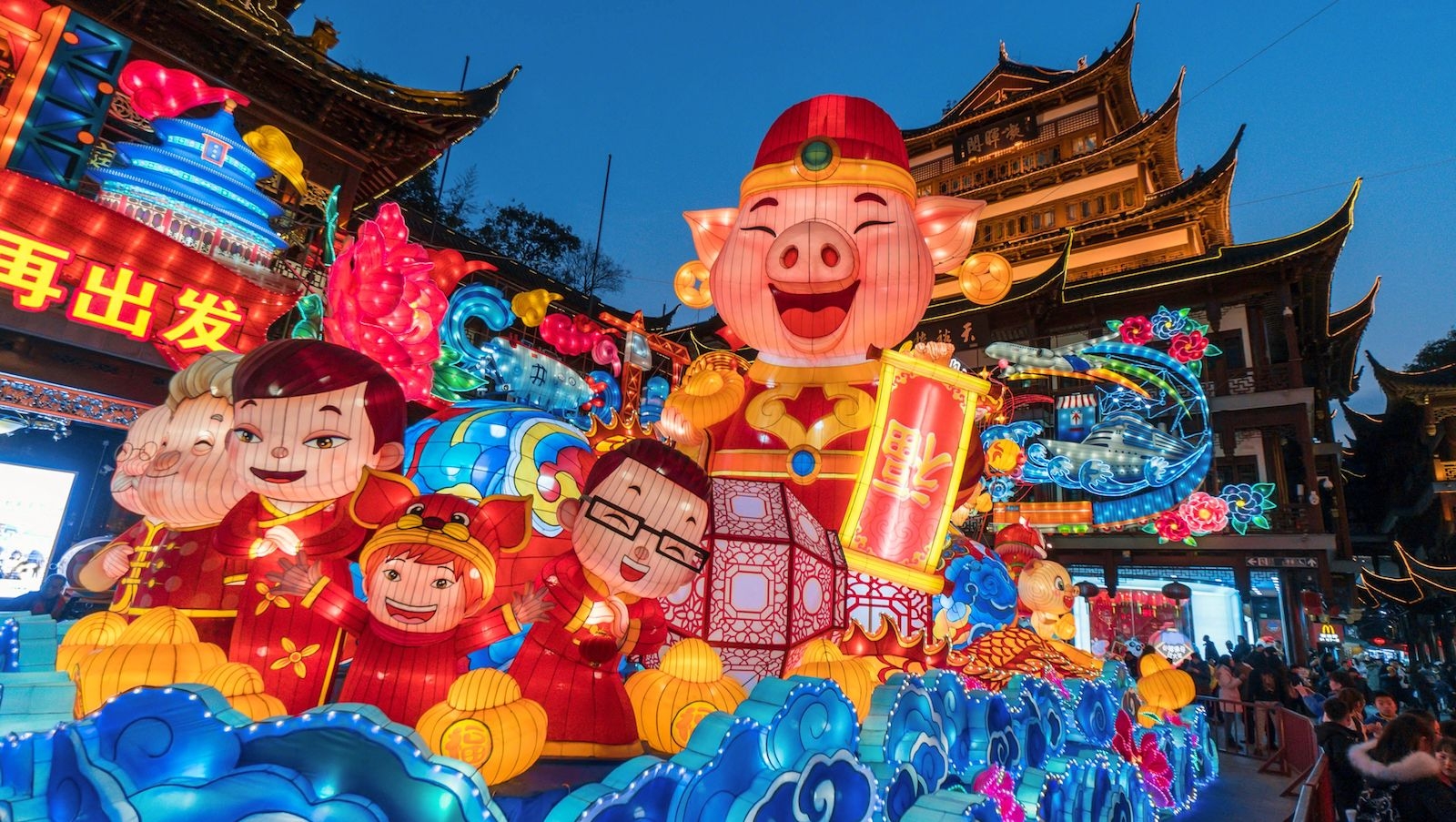 |
Since the day is recognized as the God of Wealth's birthday, the deity is respected. Furthermore, it is thought to be unwise to spend too much time away from the home in case the God of Wealth decides to stop by.
On that day, all businesses will reopen.
These days, sweeping the floor is not regarded as unlucky.
On the morning of pò wŐ (Traditional Chinese: 破五, Pinyin: pò wŐ, translated: break five), people in northern China eat JiŎozi, or dumplings.
We'll visit friends and classmates.
The Five Elements Theory is based on the belief that the day is related to the five primary colors.
Six day, zhengyue 6, ‘Birthday of Horse’
The sixth day marks a time to visit temples, relatives and friends.
Seventh day, zhengyue 7, ‘Birthday of Men’
The seventh day of the first lunar month is named renrì (Traditional Chinese: 人日, Pinyin: rén rì), literally Human Day and is considered to be the birthday of ordinary, or common men. The day is also called Day of Men or Men Day.
Eighth day - The Completion Day
On the eighth day the Fujian people have another family reunion dinner, and at midnight they pray to the Jade Emperor.
Ninth day
The Jade Emperor's birthday, which is celebrated on a Taoist holiday. The Jade Emperor, sometimes referred to as the Yù Huáng or Yù Dì, is described as the Creator of the Universe, the Lord of the Imperial Court, the God of Heaven, the Ruler of all Heavens (of which the Chinese have over thirty), Earth and the Underworld/Hell, and the God of Heaven. He is said to be the child of the Empress of Precious Moonlight and the King of the Pure Felicity Kingdom of Lofty Heavenly Majestic Lights and Ornaments, having been born several millennia before our time.
From the Tenth to the Twelfth Day
of New Year there is more feasting with friends and family.
Thirteenth day
A time to diet a bit after so much rich food, vegetarian food like rice and mustard greens are eaten to cleanse the digestive systems.
Forteenth day, The Lantern Decoration Day
Preparations will be made for the Lantern Festival.
Fifteenth day, Lantern Festival
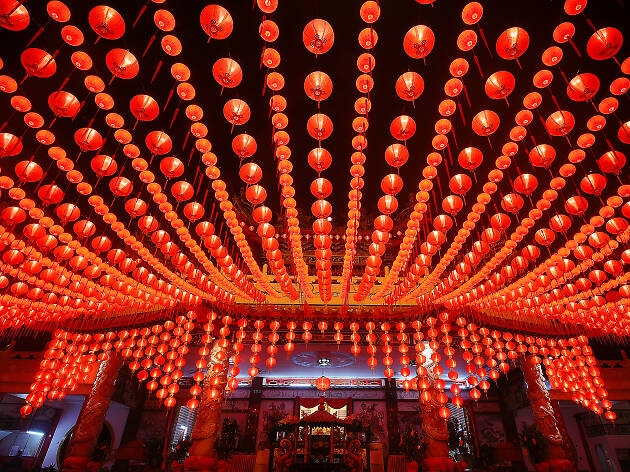 |
| Photo: Time out |
(Traditional Chinese: 元宵節 , Pinyin: yuán xiāo jié, literally: first night festival)
First night of the full moon, or yuán xiāo jié (literally, "first night of the full moon"), falls on the fifteenth day following the Spring Festival and the New Year. It is also referred to as Lantern Festival Day.
Lanterns and oranges play a major role in the festivities of another reunion dinner.
Eating unique sweet dumplings shaped like the full moon, called yuanxiao, is customary. These round balls, which represent reunion, are filled with sugar fillings and made of glutinous rice flour.
Dos and Don'ts Things Should be Noted
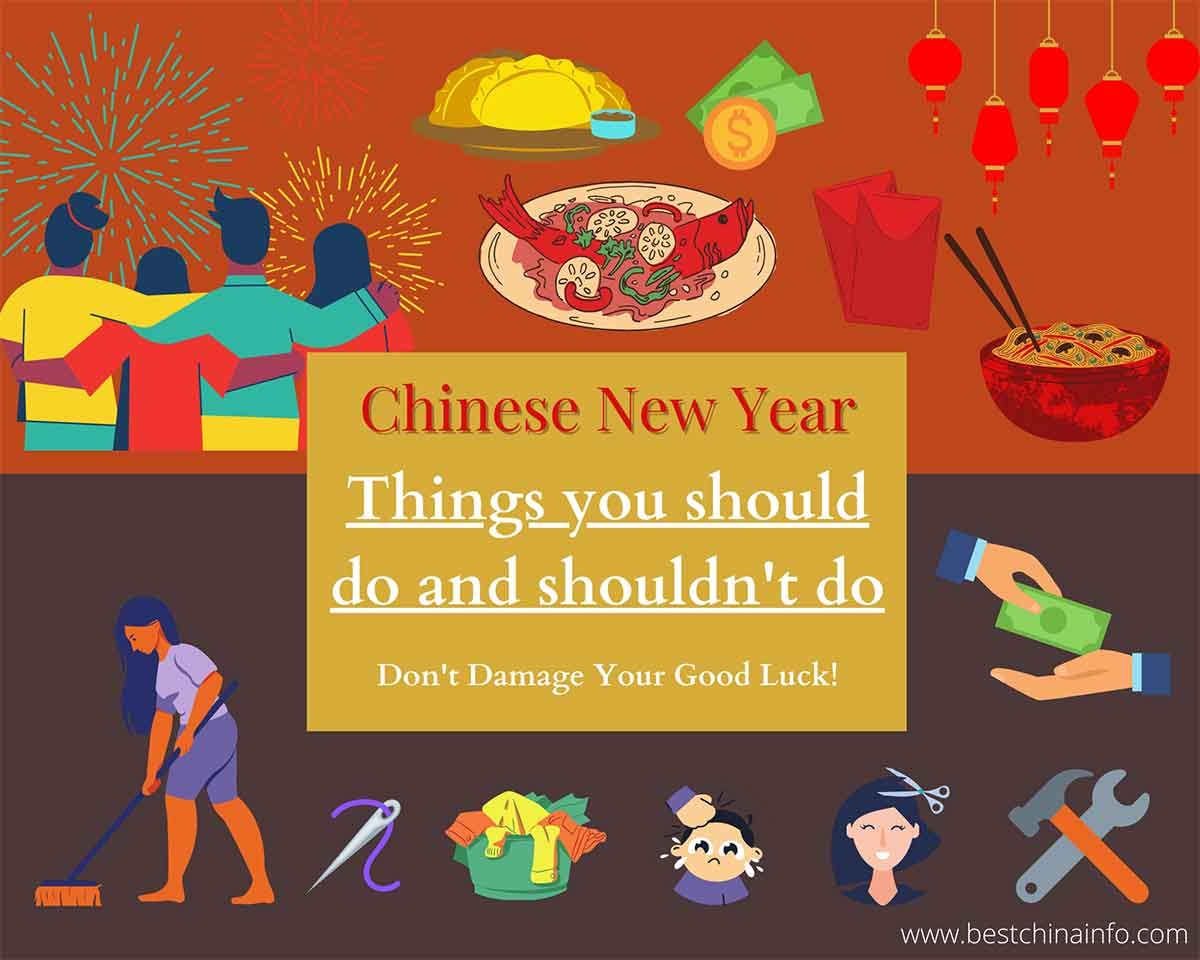 |
| Photo: Best China Info |
The following things you should and should not do during Chinese New Year
1. Wait Pa, you mean we get to stay up late?
On New Year's Eve, kids should stay up as late as they can to bid the old year farewell and greet the new one. It is also customary to think that the later they stay up, the longer their parents' lives will be. After the family reunion meal, they would undoubtedly be overjoyed to spend more time playing with their cousins!
2. Merry… I Mean 恭喜发财 Uncle, Aunty!
Remind yourself and your children to say "恭喜发财" (or Gong Xi Fa Cai) to everyone they meet in order to wish them a happy and prosperous new year. It is customary to exchange well wishes with one another in order to put past grievances behind you and to truly wish everyone in your vicinity peace and happiness. It is sometimes necessary for parents to remind their kids to express gratitude and not to open their red packets in front of the recipient.
3. The Early Bird Gets The Ang Bao
On the first day of Chinese New Year, children should wake up early in the morning to greet their parents and wish them a happy and healthy New Year. In return, they will receive a red packet blessing from their parents.
4. Nothing But Red
To celebrate the new year, everyone—including infants and kids—should be dressed in brand-new, vibrant clothing. Advise your son to wear a red t-shirt in place of his beloved Batman one and save his favorite for a different occasion. One of my favorite colors is red because it represents good fortune and wealth. Above all, avoid wearing black or white apparel, as these are the customary colors associated with mourning.
5. Come, help Mama clean and sweep the floor
Every home should receive a thorough spring cleaning before the New Year arrives; your kids can assist with this as well! Afterwards, the Chinese consider doing any kind of housework, including cleaning, to be sweeping away any good luck, so doing so is frowned upon during the New Year holiday.
6. Watch Your Tongue Boy!
Encourage the kids to refrain from fighting during Chinese New Year (don't we all wish this could last all year long?) and to keep talking about things other than ghosts and death. The word four, which sounds like the word for "death," and any kind of foul language are additional terms that are strictly forbidden.
7. Be Extra Careful
Remind children to be extra careful not to break anything since breaking dishes invite more misfortune in the new year. Even when you’re eating fish, be careful not to break any of the bones!
8. Did You Bring Your Oranges?
Traditionally, people who are visiting during Chinese New Year bring mandarin oranges, as the fruit's Mandarin name is 橘, which sounds like 吉 and means "auspicious."
Every family member (including children) should give the heads of the household two mandarin oranges when you visit their homes and should also give them the traditional New Year's greetings.
Taboos
1. Don't Anger and Don't Argue
Since everybody is in a festival mood under a joyful and hilarious atmosphere, people shouldn't argue each other. People should use auspicious words, not dirty words. Also parents shouldn't scold or punish the children. Otherwise, you will have more argument in the New Year.
2. Don't Touch shear, Needle and Knife
Women shouldn't use knife or shear in the kitchen, which indicates evil, anger, danger and cutting out the luck. As a result, women don't cook new dishes on this day, people eat meals from the leftover.
3. Don't Break Things
Breaking dish plate, bowel or cup means bad money luck coming. In case that happens, then Chinese put all broken pieces in a round container until the coming trash day.
4. Married Women Don't Visit Parent’s Home
A married woman shouldn't go back to her parent’s home, otherwise her parent’s family will get poorer.
5. Don't Make Dirty and Take Away Trash
To sweep the floor or dump the trash will take away the wealth and luck from the house.
6. Don't Make a Noon Nap
Don't have a lunch nap at noon; otherwise people will be lazy year long.
7. Don't Wash Hair
To wash the hair will wash your good luck away.
8. Don't Wear in Black or White
Don't wear in black or white to visit friends, because black and white are funeral color in China.
9. Don't Visit Unfortunate House
People shouldn't visit friend's house, if they have a family member newly past away.
10. Don't Visit Doctor or Hospital
People shouldn't visit Doctor or Hospital. That will bring illness later during the new year.
11. Don't Have Rice Porridge
Don't eat rice porridge in the morning breakfast; otherwise you won't get rich because only poor people eat rice porridge in the past.
12. Don't Eat Meat in the Morning
Don't eat meat in the morning breakfast, because many gods who are vegetarians arrive New Year Day festival in the morning.
13. Don't Wake Up People
Don't wake up people by calling their names, otherwise that sleeping person needs people's push all year long.
14. Don't Take Unnecessary Medicine
Don't take unnecessary medicine; otherwise you will become unhealthy this year.
15. Don't Wash Clothes
Don't wash clothes, because New Year Day is the birthday of the God of Water.
16. Don't Ask Debtor's Money
If someone owes you money, do not ask for the money back on this day. Otherwise, you will do it often in the rest of the year.
17. Don't Lend or Borrow Money
To borrow money from someone or lend money to someone will cause the money dispute. The worse thing is that it might lead to debit in coming year.
18. Don't Leave Wallet from Your Hands
Don't let people take anything away from your pocket or purse, because that's a sign of money loss in the year, cites chinesefortunecalendar.
19. Here’s Something Fishy
Although it may seem paradoxical, eat a lot of fish but don't finish it all. Since the Chinese words for "fish" (魚, yú) and "plenty" (餘, yú) are similar, eating fish is a must for Lunar New Year. But, you should leave some fish on the plate to represent abundance for the future because you don't want to "eat up" all of your good fortune.Fish flipping is likewise regarded as unlucky. Rather than flipping the fish after the top half is consumed, remove the spine to avoid making your gain a loss.
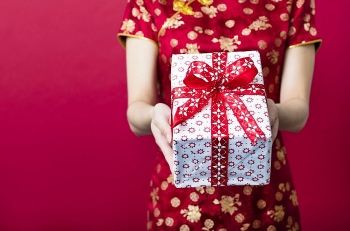 Chinese New year Gifts Giving Etiquette: What are top best-recommended? Chinese New year Gifts Giving Etiquette: What are top best-recommended? |
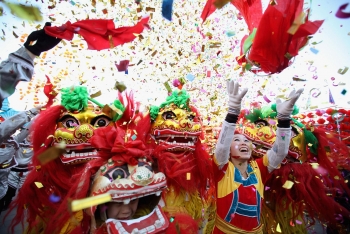 Which Countries Celebrate the Lunar New Year Besides China? Which Countries Celebrate the Lunar New Year Besides China? |
 Taboos and Superstitions in Chinese Lunar New Year Taboos and Superstitions in Chinese Lunar New Year |

